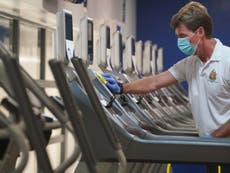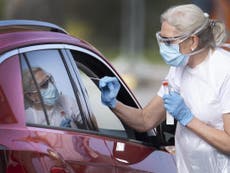The UK can’t stave off the second wave without a zero-covid strategy
Countries like New Zealand and Vietnam have seen results using the same approach. At this point, attempting to live with the virus isn’t an option

Your support helps us to tell the story
From reproductive rights to climate change to Big Tech, The Independent is on the ground when the story is developing. Whether it's investigating the financials of Elon Musk's pro-Trump PAC or producing our latest documentary, 'The A Word', which shines a light on the American women fighting for reproductive rights, we know how important it is to parse out the facts from the messaging.
At such a critical moment in US history, we need reporters on the ground. Your donation allows us to keep sending journalists to speak to both sides of the story.
The Independent is trusted by Americans across the entire political spectrum. And unlike many other quality news outlets, we choose not to lock Americans out of our reporting and analysis with paywalls. We believe quality journalism should be available to everyone, paid for by those who can afford it.
Your support makes all the difference.We are seeing a renewed rise in Covid-19 cases, both globally and here in Britain. The number of cases in Britain is currently rising by almost 3,000 a day. And this is just as school and university students have begun to return to education.
It’s unsurprising that many are reluctant to return to work when the pandemic is raging. The virus is affecting everyone but is disproportionately hitting low-income households, the most vulnerable and Bame communities. Ministers are kidding themselves if they believe that ordinary people have not registered the fact that parliament has agreed to continue remote working for MPs and staff while the government is trying to force people back to work. Everyone should be protected by government policy, not just a few.
As such, Britain needs a “zero Covid” strategy which puts the health of the people first. The sharply rising infection numbers mean that there is an urgent need for a robust strategy to protect us all. The new coronavirus restrictions for social gatherings – making it illegal for groups of more than six to gather socially – fall woefully short of that.
The sharp increase in Covid-19 cases we’re seeing now is because the government got it wrong the first time around. It did not pursue a zero Covid strategy, and it did not act fast enough. Lockdown was enforced too late and lifted too early – before the level of infections had been reduced to minimal levels. In that light, it is reckless and dangerous to continue forcing people back to work and easing lockdown in some regions. It is also probably futile. It is impossible to force most people to resume their normal social lives while they are justifiably fearful of the pandemic. Reducing the virus to minimal levels is not in contradiction to economic recovery. It is the precondition for a sustainable economic recovery.
A zero Covid strategy has been successfully implemented in countries such as New Zealand as well as others in the Asian Pacific. These are the countries that have successfully reduced the virus to minimal levels. It is possible here too.
Bodies such as Independent Sage have advocated for such a strategy. It should not be overlooked that the virus was declining rapidly in this country until easing measures were introduced. Even the belated lockdown here had a significant impact in suppressing the virus. It was the premature easing which has led to the renewed upturn in cases. We can effectively eliminate the virus if effective lockdowns are implemented, alongside a proper tracing, tracking and isolation system being introduced.
The strategy should include four key points: First, there should be a target to reduce the number of new Covid-19 cases week on week. Failure to achieve that should mean stricter measures are enforced.
Secondly, government efforts should be focused on accelerating the development of a comprehensive, locally-led, but nationally supported, test, track and isolate programme. A working and workable tracing app is long overdue and is now absolutely urgent.
Thirdly, there must be effective screening at airports and other transport hubs such as train stations. Borders are meaningless to any virus. But mass travel of all kinds increases contact, and so extra steps are required to protect travellers, transport workers and the wider public. Finally, government accountability has been brushed aside and bringing back daily coronavirus briefings is a minimum first step in trying to re-establish it.
At the same time, employers’ organisations such as Make UK, trade unions and the TUC are completely right in calling for the government to extend its support for businesses and workers. The furlough scheme must be extended, as has been done in France, Germany, the Netherlands and Ireland. This is necessary while the virus is being brought under control. Without it, we will see spiralling unemployment. The cost of extending the furlough scheme is tiny in comparison to the costs to the economy, public finances and ordinary people’s lives if unemployment stretches into the millions.
We cannot live safely with the virus. And we should not attempt to. The government must adopt a policy of eliminating it. We need a zero Covid strategy.
Diane Abbott was shadow home secretary between 2016 and 2020, and is Labour MP for Hackney North and Stoke Newington




Join our commenting forum
Join thought-provoking conversations, follow other Independent readers and see their replies
Comments